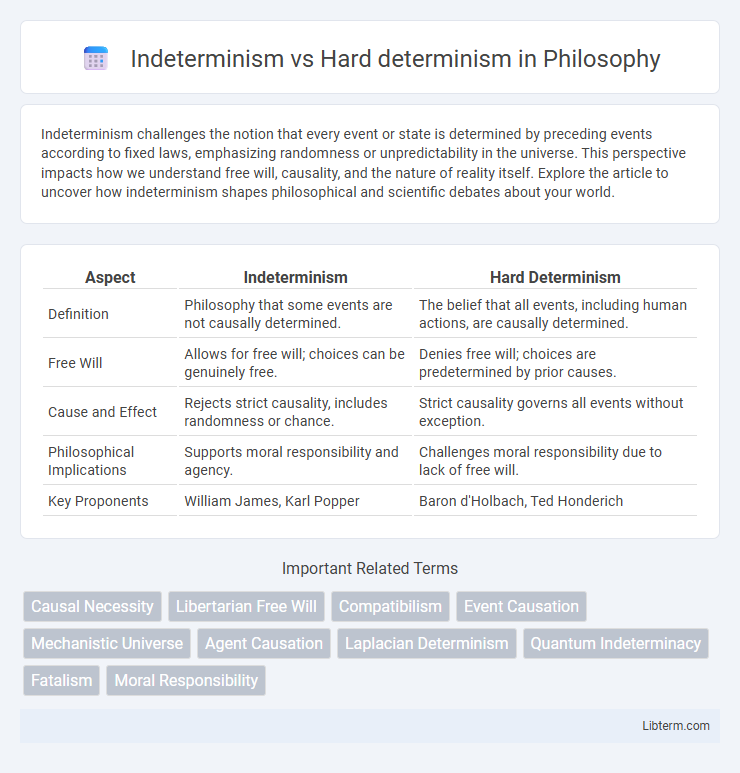Indeterminism challenges the notion that every event or state is determined by preceding events according to fixed laws, emphasizing randomness or unpredictability in the universe. This perspective impacts how we understand free will, causality, and the nature of reality itself. Explore the article to uncover how indeterminism shapes philosophical and scientific debates about your world.
Table of Comparison
| Aspect | Indeterminism | Hard Determinism |
|---|---|---|
| Definition | Philosophy that some events are not causally determined. | The belief that all events, including human actions, are causally determined. |
| Free Will | Allows for free will; choices can be genuinely free. | Denies free will; choices are predetermined by prior causes. |
| Cause and Effect | Rejects strict causality, includes randomness or chance. | Strict causality governs all events without exception. |
| Philosophical Implications | Supports moral responsibility and agency. | Challenges moral responsibility due to lack of free will. |
| Key Proponents | William James, Karl Popper | Baron d'Holbach, Ted Honderich |
Understanding Indeterminism: Definition and Origins
Indeterminism refers to the philosophical concept that not all events are causally determined by preceding factors, allowing for the existence of randomness or free will in the universe. Originating from debates in metaphysics and quantum mechanics, indeterminism challenges the deterministic view that every action or event is predictably caused by prior conditions. Key figures influencing this perspective include Aristotle, who proposed potentiality in causes, and modern physicists who reveal inherent uncertainties at the quantum level.
Hard Determinism: Key Concepts and Philosophical Roots
Hard Determinism asserts that every event, including human actions, is causally determined by preceding events and natural laws, eliminating the possibility of free will. Rooted in classical mechanics and philosophical traditions like those of Baron d'Holbach and David Hume, Hard Determinism challenges the notion of moral responsibility by claiming that choices are inevitable consequences of prior states. This perspective contrasts sharply with Indeterminism, which allows for randomness or alternative possibilities in decision-making processes.
Historical Perspectives on Determinism in Philosophy
Early philosophical perspectives on determinism trace back to ancient Greek thinkers like Democritus and Epicurus, who debated fate and free will, with Epicurus introducing the concept of atomic "swerve" to allow for indeterminism. During the Enlightenment, figures such as Spinoza and Kant advanced hard determinism by arguing that all events are causally necessary and intelligible through reason and natural laws. Nineteenth-century philosophers, including Schopenhauer and Nietzsche, further developed deterministic views, while contemporaneous critics emphasized the implications for moral responsibility and human agency, deeply influencing ongoing debates between indeterminism and hard determinism.
The Role of Causality in Indeterminism and Determinism
Indeterminism challenges the classical notion of causality by asserting that not all events are causally determined, allowing for probabilistic or random occurrences that break strict cause-effect chains. Hard determinism maintains a rigid causal framework, where every event is necessitated by prior states and natural laws, eliminating genuine free will. The role of causality in these views hinges on whether it is viewed as an absolute, law-governed sequence leading to inevitable outcomes, or as a flexible principle permitting unpredictability and alternative possibilities.
Scientific Insights: Physics and the Determinism Debate
Quantum mechanics challenges hard determinism by introducing inherent randomness at the microscopic level, undermining classical physics' deterministic worldview. Experiments such as the double-slit experiment and Bell's theorem provide empirical evidence supporting indeterminism in physical processes. Despite these findings, macroscopic phenomena often exhibit deterministic behavior, fueling ongoing debates about the interpretation and scope of indeterminism in science.
Free Will: Possibility or Illusion?
Indeterminism argues that free will exists because not all events are pre-determined, allowing genuine choice and randomness in decision-making processes. Hard determinism denies free will, claiming every action is causally determined by prior events, making personal autonomy an illusion. The debate centers on whether human behavior is governed by strict causal laws or if unpredictability enables true free will.
Moral Responsibility under Indeterminism and Hard Determinism
Indeterminism posits that actions are not pre-determined, allowing for genuine free will and thus moral responsibility, as agents can make choices that are not causally fixed. Hard determinism denies free will by asserting that all events, including human actions, are causally determined, which challenges the basis for holding individuals morally responsible. Under indeterminism, moral responsibility is preserved since agents can be seen as authors of their actions, whereas hard determinism implies that moral accountability is illusory due to the inevitability of actions.
Real-world Implications: Law, Ethics, and Society
Indeterminism challenges legal and ethical frameworks by emphasizing individual autonomy and moral responsibility in decision-making, suggesting that humans can be held accountable for their actions due to the inherent unpredictability of choices. Hard determinism asserts that all events, including human behavior, are causally determined, raising complex questions for justice systems about punishment and rehabilitation since actions are viewed as inevitable outcomes of prior states. Society grapples with these perspectives in shaping laws and ethical norms, balancing the need for social order with recognition of free will's role in personal accountability.
Critiques and Counterarguments: Strengths and Weaknesses
Indeterminism faces critiques for its reliance on randomness, which critics argue undermines coherent agency and moral responsibility by introducing unpredictability without control. Hard determinism is challenged for negating free will entirely, raising concerns about personal accountability and ethical judgment. Both perspectives present strengths in their logical consistency but exhibit weaknesses in addressing the nuanced experience of choice and moral responsibility in human behavior.
The Ongoing Debate: Indeterminism vs Hard Determinism Today
The ongoing debate between indeterminism and hard determinism centers on whether human actions are governed by randomness or strict causal laws, with indeterminism emphasizing unpredictability and free will while hard determinism asserts that every event is causally determined by preceding events. Contemporary philosophy explores quantum mechanics and neuroscience to challenge or reinforce these positions, examining how elements of chance at the quantum level might influence decision-making processes in the brain. This ongoing discourse critically impacts moral responsibility, legal accountability, and the nature of consciousness in modern ethical and scientific discussions.
Indeterminism Infographic

 libterm.com
libterm.com